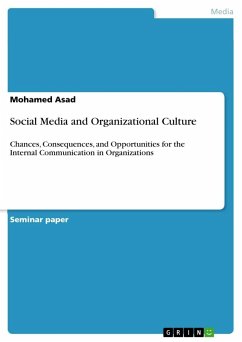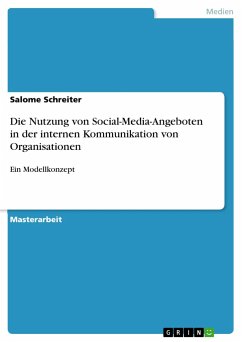
Social Media and Organizational Culture
Chances, Consequences, and Opportunities for the Internal Communication in Organizations

PAYBACK Punkte
0 °P sammeln!
Seminar paper from the year 2013 in the subject Communications - Public Relations, Advertising, Marketing, Social Media, grade: 1,0, University of Duisburg-Essen (Wirtschaftswissenschaften), language: English, abstract: For many organizations the alignment between social media and organizational culture is a massive challenge because these two concepts do not match in general. The integration of social media in organizations demands preliminary change-oriented cultures which, however, often have inflexible structures that prevent changes. In this thesis, there will be an investigation on the e...
Seminar paper from the year 2013 in the subject Communications - Public Relations, Advertising, Marketing, Social Media, grade: 1,0, University of Duisburg-Essen (Wirtschaftswissenschaften), language: English, abstract: For many organizations the alignment between social media and organizational culture is a massive challenge because these two concepts do not match in general. The integration of social media in organizations demands preliminary change-oriented cultures which, however, often have inflexible structures that prevent changes. In this thesis, there will be an investigation on the effect of social media integration on the organizational culture by use of literature review, with a special focus on the internal communication within organizations. This thesis first defines the term of social media which are very up-to-date but which are used in many cases so that a differentiated point of view has to be taken. In almost the same manner, the term organizational culture is described. This concept, however, is underestimated because the majority of people do not think of an organizational culture when looking at an organization, but they are rather profit-oriented. Thus, it is crucial to consider this social aspect of an organization. The thesis investigates this concept critically. One of the concerned elements in consequence of the combination between social media and organizational culture is the communication within an organization. An integration of social media technologies has influence on both the internal and external communication. To that effect, changes, consequences, and opportunities of social media integration the context of organizational culture are analyzed and discussed in this thesis. Therefore, the critical analysis of the subject provides an assessment and serves as a basis for the consideration of the effect of social media integration on the organizational culture. Social media may have beneficial outcomes for the organizational culture. Hence, organizational performance and job satisfaction, which are both closely related to organizational culture, are likely to increase. This is because e.g. the chance for work groups is provided by social media to organize themselves efficiently, although the members of the group might avoid each other at the workplace. Nevertheless, using social media also entails risks for the organizational culture. These risks are likely to weaken job satisfaction of employees and, thus, also the organizational culture. One example is the abuse of social media by employees in order to argue or to develop riots at worst.













